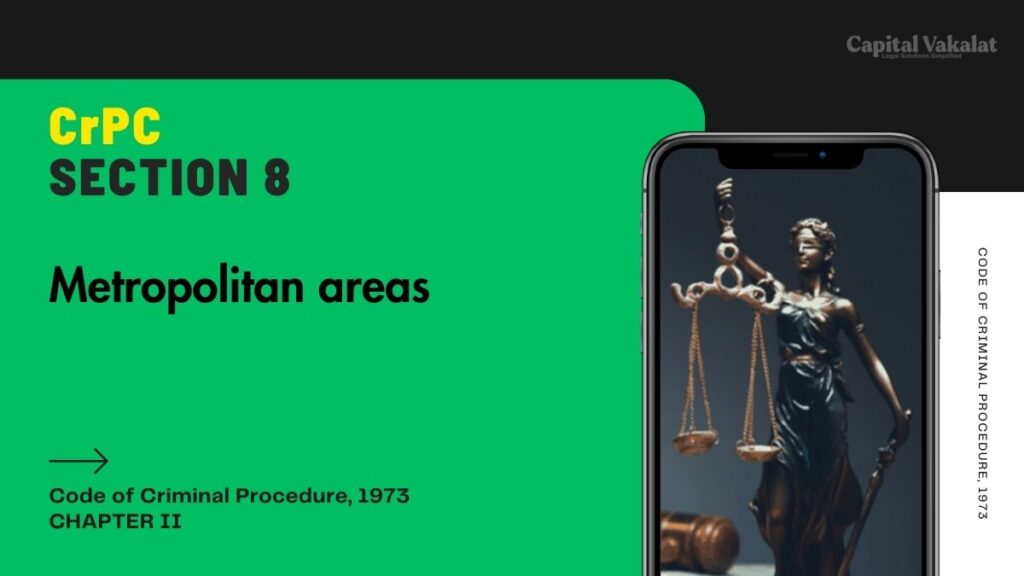Section 8 of the Code of Criminal Procedure (CrPC) is a vital aspect of Indian law that addresses the governance and jurisdiction of criminal courts within metropolitan areas. This provision ensures that the administration of criminal justice is streamlined, efficient, and capable of handling the unique challenges posed by urban settings.

Let’s delve into the intricacies of Section 8 CrPC and explore its significance in metropolitan regions.
Introduction to Section 8 CrPC
The Code of Criminal Procedure (CrPC) is the cornerstone of criminal law in India, laying down the procedural framework for the administration of criminal justice. Section 8 specifically caters to the structure and functioning of criminal courts in metropolitan areas, ensuring that they operate effectively within these densely populated regions. This section is crucial for maintaining law and order, given the complexities and higher crime rates often associated with urban areas.
Defining Metropolitan Areas Under Section 8 CrPC
Section 8 CrPC defines a metropolitan area as a region with a population of more than one million. The designation of such areas is at the discretion of the state government, which notifies the same in the Official Gazette. This classification is pivotal as it determines the applicability of certain legal provisions tailored to the needs of large, urban populations.
Jurisdiction of Criminal Courts in Metropolitan Areas
Metropolitan areas under Section 8 CrPC are served by Metropolitan Magistrates and Sessions Courts. These courts are endowed with specific powers to address the distinct legal challenges that arise in urban settings. The streamlined structure aims to expedite legal proceedings and ensure that justice is delivered promptly.
Role of Metropolitan Magistrates
Metropolitan Magistrates play a critical role in the administration of justice within metropolitan areas. They handle a wide range of cases, from minor offenses to significant criminal matters. The powers and duties of Metropolitan Magistrates are designed to address the fast-paced and often complex nature of urban crime.
Powers of Metropolitan Sessions Courts
Metropolitan Sessions Courts are tasked with handling more severe criminal cases. They have the authority to adjudicate serious offenses, including those that carry severe penalties. The efficient functioning of these courts is essential for maintaining law and order in metropolitan regions, where crime rates can be significantly higher.
Advantages of Section 8 CrPC for Metropolitan Areas
Enhanced Efficiency: The establishment of Metropolitan Magistrates and Sessions Courts ensures that cases are handled swiftly, reducing the backlog often seen in urban areas.
Specialized Handling: The designation of specific courts for metropolitan areas allows for more specialized handling of cases, catering to the unique needs of urban populations.
Accessibility: By situating courts within metropolitan areas, the accessibility of legal recourse is improved for residents, ensuring that justice is within reach for all.
Challenges Faced by Metropolitan Courts
Despite the advantages, metropolitan courts under Section 8 CrPC face numerous challenges. These include dealing with high caseloads, resource constraints, and the complexities of urban crime. Addressing these challenges requires continuous efforts to enhance the infrastructure and capabilities of these courts.
Significance of Section 8 CrPC in Urban Law and Order
The significance of Section 8 CrPC in maintaining urban law and order cannot be overstated. By providing a robust legal framework tailored to metropolitan areas, this provision plays a key role in ensuring that the justice system can effectively respond to the demands of urban environments.
Impact on Crime Rates in Metropolitan Areas
The effective implementation of Section 8 CrPC has a direct impact on crime rates in metropolitan areas. By ensuring that cases are processed efficiently and justice is delivered promptly, this provision helps in deterring crime and maintaining social order.
Case Studies of Section 8 CrPC in Action
Examining case studies where Section 8 CrPC has been effectively implemented provides valuable insights into its practical application. These case studies highlight the successes and areas for improvement, offering a comprehensive understanding of the provision’s impact on metropolitan justice.
Future Prospects of Section 8 CrPC
As metropolitan areas continue to grow, the relevance of Section 8 CrPC will only increase. Future prospects include further refinements to the legal framework to address emerging challenges and ensure that the administration of justice keeps pace with urbanization.
Conclusion
Section 8 CrPC is a critical provision that addresses the unique needs of metropolitan areas in India. By providing a specialized legal framework, it ensures that criminal justice is administered efficiently and effectively in urban settings. The continuous evolution of this provision will be essential in meeting the demands of rapidly growing metropolitan regions.
Frequently Asked Questions
How are metropolitan areas defined under Section 8 CrPC?
Metropolitan areas are defined as regions with a population exceeding one million, as notified by the state government in the Official Gazette.
What is the role of Metropolitan Magistrates under Section 8 CrPC?
Metropolitan Magistrates handle a range of criminal cases in metropolitan areas, ensuring that legal proceedings are expedited and justice is delivered efficiently.
What challenges do metropolitan courts face?
Metropolitan courts face challenges such as high caseloads, resource constraints, and the complexities of urban crime, necessitating continuous enhancements in infrastructure and capabilities.
How does Section 8 CrPC impact crime rates in metropolitan areas?
By ensuring efficient legal proceedings and prompt delivery of justice, Section 8 CrPC helps in deterring crime and maintaining social order in metropolitan areas.
What are the future prospects of Section 8 CrPC?
Future prospects include further refinements to address emerging challenges and ensure that the administration of justice keeps pace with urbanization.